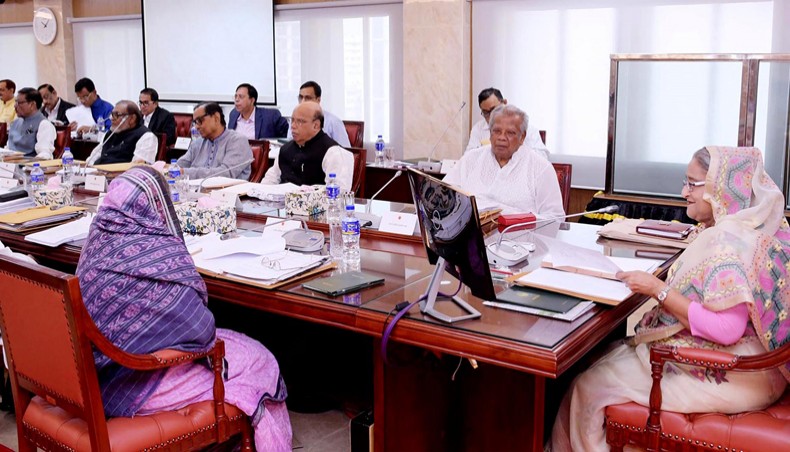Cabinet nods to bills on broadcast, mass-media employees
The cabinet on Monday endorsed the Broadcasting Bill proposing restrictions on the transmission of programmes, news or advertisements ‘harmful to the country’s history and image, public interest or law and order’ by television and radio networks or online media.
The cabinet approval for the proposed law came in the wake of widespread criticisms and concerns over the recently enacted Digital Security Act, feared to be misused to gag the media as certain sections of the law threatened the freedom of expression and independent journalism.
The Broadcasting Bill proposed setting up of a broadcasting commission to regulate the electronic media in keeping with the international practices and standard for ‘ensuring objectivity, neutrality and accountability’ of the mass media, cabinet secretary Mohammad Shafiul Alam said at a briefing after the cabinet meeting at the Cabinet Division.
The cabinet also approved the Mass Media Employees (Conditions of Service) Bill redefining journalists and press workers and other employees of newspapers as ‘mass media employees’.
‘Presently journalists, press workers and other employees of newspapers are defined as workers in the Bangladesh Labour Law 2006. They would now be excluded from the labour law,’ Shafiul said.
The services of newspaper employees would be regulated under the proposed law once enacted, he said, adding that the new law would allow the government to form mass media wage board to fix wages for the newspaper employees in every five years.
The cabinet secretary said that a broadcasting commission would be constituted with seven members—one of them would be woman—and the president would appoint one of the members as chairman of the commission.
The information ministry placed both the bill in the weekly cabinet meeting chaired by prime minister Sheikh Hasina.
The Broadcasting Bill proposed seven-year imprisonment and a fine of Tk 5 crore as maximum punishment for offences, Shafiul said, adding 24 offences were defined in the bill.
In August 2014, the cabinet approved the country’s first national broadcasting policy with restrictions on transmission of news and advertisements by television and radio networks and also facilitating government’s intervention in news, advertisements and talk-show contents to be broadcast by television and radio networks.
The proposed commission would be empowered to make decisions on matters not covered in the law, the bill said.
Airing programmes or advertisements that may pose threat to national security and sovereignty or may appear satirical to national ideology will be prohibited, said the bill.
It also proposed prohibition against airing programmes against a foreign country that might affect the ties and news that might foment hatred in the society, threaten the country’s territorial integrity and disturb sectarian harmony or anything contrary to traditional values of the nation.
The proposed law would allow the government to keep the media under constant pressure, said journalists.
In that case the media would need to forego its role in keeping the government under pressure on burning issues, they said in instant reactions on the bill.
Many of the offences were left open to subjective interpretation leading to their misuse by the authorities, they said, expressing fear that it would create scopes for curbing media freedom.
The bill proposed that all private television channels and radio stations must broadcast government bulletins and important programmes on the issues of national interests, like weather, health and official press notes.
It proposed that private television channels, radio stations, community and online-radio networks and online media houses must obtain and renew operating licences from the commission.
The broadcasting licences would not be transferrable, said the bill.
Dhaka University mass communication and journalism associate professor Saiful Alam Chowdhury said that until and unless, the difference among misinformation, disinformation and mal-information was defined with clarity, there would be the scope for the abuse of the law.
The journalism teacher having experience of working as television journalist said that the offences were not clearly defined in the bill and that would always give scope for subjective interpretations.
The Bangladesh Labour Act was enacted in 2006 repealing the Newspaper Employees (Conditions of Service) Act 1974 and incorporating all employees of the newspapers as workers.
A media employee would now require working 36 hours a week instead of the existing 48 hours and female employee would be entitled to six-month maternity leave once Mass Media Employees (Conditions of Service) Bill is passed, the cabinet secretary said.
It would be mandatory for the media owners to implement the wage board award approved by the government, said the bill.
In case of violation, the person or the company concerned would be fined minimum Tk 50,000 and maximum Tk 5 lakh and non-payment of the fine would warrant jail for six months.
News Courtesy: www.newagebd.net











